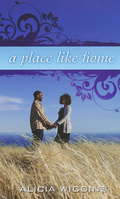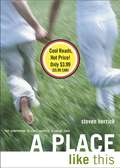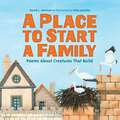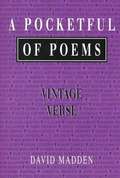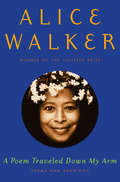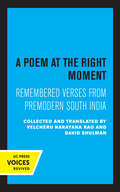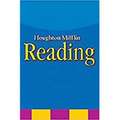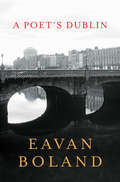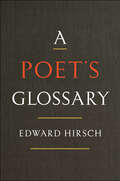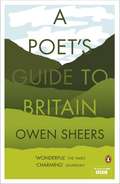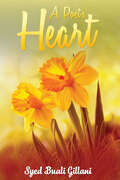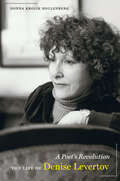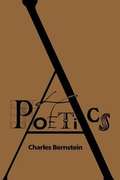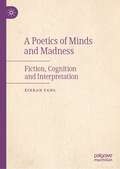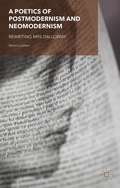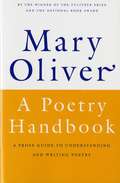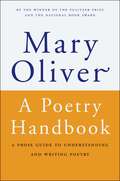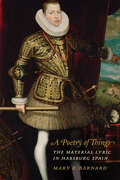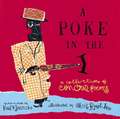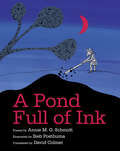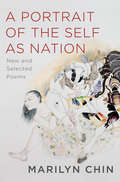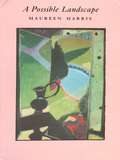- Table View
- List View
A Place Like This
by Steven HerrickJack and Annabel have decided to put off university and drive around the country. It all seems wildly romantic, but when their car dies two days into the trip, they end up at George's apple orchard. They figure it's a temporary pit stop--and at first it is. But when Jack recognizes a familiar suffering in George's family, he and Annabel decide to stay for a while. They're not sure how to help, but they know they want to try... This companion to Love, Ghosts, & Facial Hair captures the difficult search for identity in an isolated place.
A Place to Start a Family: Poems About Creatures That Build
by David L. HarrisonA poetry collection introducing animal architects that build remarkable structures in order to attract a mate and have babies.Many animals build something--a nest, tunnel, or web--in order to pair up, lay eggs, give birth, and otherwise perpetuate their species. Organized based on where creatures live--underground, in the water, on land, or in the air--twelve poems bring fish, insects, reptiles, mammals, and birds to life. Back matter includes more information about each animal."A fine synthesis of poetry and science" — Kirkus Reviews"An inviting introduction to a dozen industrious creatures" — Publishers Weekly "A natural for classroom use, with eye-catching art that will lure little ones in" — Booklist ILA Teachers' Choices
A Pocketful of Poems
by David MaddenContaining 125 poems, this companion contains some of the most commonly studied works in classes around the country.
A Poem Traveled Down My Arm: Poems and Drawings
by Alice WalkerIn this illuminating book, Pulitzer Prize–winning novelist and acclaimed poet Alice Walker reveals her remarkable philosophy of life. Curiously, this labor of love started with the author’s signature: Faced with the daunting task of providing autographs for multiple copies of one of her poetry collections, Absolute Trust in the Goodness of the Earth, Walker turned an act of repetition into an act of inspiration. For each autograph became something more than a name: a thoughtful reflection, an impromptu sketch, a heartfelt poem. The result is this spontaneous burst of the unexpected. A Poem Traveled Down My Arm is a lovely collection of insights and drawings—by turns charming and humorous, provocative and profound—that represent the wisdom of one of today’s most beloved writers. The essence of Walker’s independent spirit emanates from words and images that are simple but deep in meaning. An empowering approach to life. . . the inspiration to live completely in the moment. . . the chance to nurture one’s creativity and peace of mind—all these beautiful elements are evoked by this unusual and original book.
A Poem at the Right Moment: Remembered Verses from Premodern South India (Voices from Asia #10)
by David Shulman Narayana Rao VelcheruA Poem at the Right Moment collects, and preserves, poems—called catus—that have circulated orally for centuries in South India. The poems are remarkable for their wit and precision, their lyrical insight on the commonplace, their fascination with sensual experience, and their exploration of the connection between language and desire. Taken together the catus offer a penetrating critical vision and an understanding of the classical traditions of Telugu, Tamil, and Sanskrit. Each poem is presented in a contemporary English translation along with the Indian-language original. An introduction and a concluding essay explore in detail the stories and texts that comprise the catu system. This title is part of UC Press's Voices Revived program, which commemorates University of California Press’s mission to seek out and cultivate the brightest minds and give them voice, reach, and impact. Drawing on a backlist dating to 1893, Voices Revived makes high-quality, peer-reviewed scholarship accessible once again using print-on-demand technology. This title was originally published in 1998.
A Poem for Grandma (Leveled Readers 4.4.4)
by Andrew ClementsAn extremely shy young girl overcomes her shyness and reads one of her poems to an audience.
A Poet from the Plains (Houghton Mifflin Harcourt Vocabulary Readers #Leveled Reader: Level: 4, Theme: 4)
by Patricia Ann LynchTells of the life of Virginia Driving Hawk Sneve who has written over 20 books--mostly about Native American life.
A Poet's Dublin
by Eavan BolandJuxtaposing verse and image, A Poet's Dublin is a study of origin and influence from "a major Irish poet" (Edward Hirsch). Written over years, the transcendent and moving poems in A Poet's Dublin seek out shadows and impressions of a powerful, historic city, studying how it forms and alters language, memory, and selfhood. The poems range from an evocation of the neighborhoods under the hills where the poet lived and raised her children to the inner-city bombing of 1974, and include such signature poems as "The Pomegranate," "The War Horse," and "Anna Liffey." Above all, these poems weave together the story of a self and a city--private, political, and bound by history. The poems are supported by photographs of the city at all times and in all seasons: from dawn on the river Liffey, which flows through Dublin, to twilight up in the Dublin foothills.
A Poet's Glossary
by Edward HirschA major addition to the literature of poetry, Edward Hirsch’s sparkling new work is a compilation of forms, devices, groups, movements, isms, aesthetics, rhetorical terms, and folklore—a book that all readers, writers, teachers, and students of poetry will return to over and over. Hirsch has delved deeply into the poetic traditions of the world, returning with an inclusive, international compendium. Moving gracefully from the bards of ancient Greece to the revolutionaries of Latin America, from small formal elements to large mysteries, he provides thoughtful definitions for the most important poetic vocabulary, imbuing his work with a lifetime of scholarship and the warmth of a man devoted to his art.Knowing how a poem works is essential to unlocking its meaning. Hirsch’s entries will deepen readers’ relationships with their favorite poems and open greater levels of understanding in each new poem they encounter. Shot through with the enthusiasm, authority, and sheer delight that made How to Read a Poem so beloved, A Poet’s Glossary is a new classic.
A Poet's Guide to Britain
by Owen SheersIntroduced and selected by the poet-presenter Owen Sheers, A Poet's Guide to Britain is a major poetry anthology that ties in with the BBC series of the same name.Owen Sheers passionately believes that poems, and particularly poems of place, not only affect us as individuals, but can have the power to mark and define a collective experience - our identities, our country, our land. He has chosen six powerful poems, all personal favourites, and all poems that have become part of the way we see our landscape. The anthology follows a similar format to the BBC series itself, while also offering paper chains of poems about the landscape and nature of Britain, transcripts of contemporary poet interviews, and a short introduction to each lead poem.
A Poet's Heart
by Syed Buali GillaniLies of nightIf the tip of a sun doesn’t wash your ink away,Then your eye has sinned throw that lamp away,This darkness like a sigh is the sight of an eye,With the rise of a sun comes the news of a night,That which will give a raging fever to your art,For years has to burn like a flame in your heart,Every wood brings change when placed in a pyre,Happy or sad it’s bewildered by a fire,Filled with memories are your empty eyes,Full of life but your spirit has died,A night always comes with a dagger in one hand,For those happy boarders of a joyful land,The fire of love burns in those parts of hell,Where windows of heaven open to drizzle her smell,And If god lives in heart or so says the Christian man,Then when a heart is broken does he feel the pain?I wrote this poem in fear that should a day come where I have to write a synopsis for this book what will I say? Well, this short poem truly encapsulates my story, words, sentences, and paragraphs don’t do justice to art, so “Let the rise of sun be the proof of sun”. Poetry has burnt within me for years. This book is about that fire, I believe every single person in the world has an interesting story to tell, but not all can tell an interesting story. Then there are those stories that are both interesting and intense, those stories are really worth telling. While a neurotic can choke on his own intensity, an artist makes a story out of the flesh of his madness. There is not a lot of difference between the two, except the latter is somehow penetrable.
A Poet's Revolution
by Donna HollenbergThis first full-length biography of Anglo- American poet and activist Denise Levertov (1923-1997) brings to life one of the major voices of the second half of the twentieth century, when American poetry was a powerful influence worldwide. Drawing on exhaustive archival research and interviews with 75 friends of Levertov, as well as on Levertov's entire opus, Donna Krolik Hollenberg's authoritative biography captures the full complexity of Levertov as both woman and artist, and the dynamic world she inhabited. She charts Levertov's early life in England as the daughter of a Russian Hasidic father and a Welsh mother, her experience as a nurse in London during WWII, her marriage to an American after the war, and her move to New York City where she became a major figure in the American poetry scene. The author chronicles Levertov's role as a passionate social activist in volatile times and her importance as a teacher of writing. Finally, Hollenberg shows how the spiritual dimension of Levertov's poetry deepened toward the end of her life, so that her final volumes link lyric perception with political and religious commitment.
A Poetics
by Charles BernsteinThis collection is considered to be more than a work of criticism by the poet Charles Bernstein, it is a poetic intervention into criticism. Artifice of Absorption, a key essay, is written in verse, and its structures and rhythms initiate the reader into the strength and complexity of the argument.
A Poetics of Minds and Madness: Fiction, Cognition and Interpretation
by XINRAN YANGThis monograph aims to explore the mind-narrative nexus by conducting a cognitive narratological study on the mad minds in fictional narratives. Set on the interface of narrative and cognitive science (cognitive linguistics, cognitive psychology and cognitive neuropsychology), it adopts an indirect empirical approach to the fictional representation of madness. The American writer Ken Kesey’s novel One Flew Over the Cuckoo’s Nest is chosen as the primary text of investigation, whereas due consideration is also given to other madness narratives when necessary. This book not only demonstrates the value of reading and rereading literary classics in the modern era, but also sheds light on the studies of cognitive narratology, cognitive poetics, madness narratives and literature in general.
A Poetics of Postmodernism and Neomodernism
by Monica LathamVirginia Woolf's Mrs Dalloway, one of the most significant modernist texts from the Western literary canon, has spawned numerous contemporary offspring. Contemporary authors have dialogued with it, challenged it, reinvented it and offered creative responses to it, thus reinforcing its accumulated critical reputation and canonical status. After meticulously tracing the genesis of Woolf's most iconic novel so as to examine the production of Woolf's idiosyncratic Dalloway-esque signature, A Poetics of Postmodernism and Neomodernism sets out to explore its reproduction by a variety of postmodernist and neomodernist Anglo-American writers who are either openly indebted to Woolf's novel or covertly influenced by it. The contemporary tributes that are indebted to Mrs Dalloway in so many ways have rejuvenated the Woolfian novel and have propelled it into the twenty-first century. Almost a hundred years after its publication, Woolf's Mrs Dalloway has proved to be an enduring text, an 'ice-breaking vessel' which continues to invite 'individual talents' to follow in its wake.
A Poetry Handbook
by Mary OliverWith passion, wit, and good common sense, the celebrated poet Mary Oliver tells of the basic ways a poem is built-meter and rhyme, form and diction, sound and sense. Drawing on poems from Robert Frost, Elizabeth Bishop, and others, Oliver imparts an extraordinary amount of information in a remarkably short space. “Stunning” (Los Angeles Times).
A Poetry Handbook: A Prose Guide to Understanding and Writing Poetry
by Mary Oliver“Mary Oliver would probably never admit to anything so grandiose as an effort to connect the conscious mind and the heart (that’s what she says poetry can do), but that is exactly what she accomplishes in this stunning little handbook.”—Los Angeles Times From the beloved and acclaimed poet, an ultimate guide to writing and understanding poetry. With passion and wit, Mary Oliver skillfully imparts expertise from her long, celebrated career as a disguised poet. She walks readers through exactly how a poem is built, from meter and rhyme, to form and diction, to sound and sense, drawing on poems by Robert Frost, Elizabeth Bishop, and others. This handbook is an invaluable glimpse into Oliver’s prolific mind—a must-have for all poetry-lovers.
A Poetry of Things: The Material Lyric in Habsburg Spain (Toronto Iberic)
by Mary E. BarnardA Poetry of Things examines the works of four poets whose use of visual and material culture contributed to the remarkable artistic and literary production during the reign of Philip III (1598–1621). Francisco de Quevedo, Luis de Góngora, Juan de Arguijo, and Luisa de Carvajal y Mendoza cast cultural objects – ranging from books and tombstones to urban ruins, sculptures, and portraits – as participants in lively interactions with their readers and viewers across time and space. Mary E. Barnard argues that in their dialogic performance, these objects serve as sites of inquiry for exploring contemporary political, social, and religious issues, such as the preservation of humanist learning in an age of print, the collapse of empires and the rebirth of the city, and the visual culture of the Counter-Reformation. Her inspired readings explain how the performance of cultural objects, whether they remain in situ or are displayed in a library, museum, or convent, is the most compelling.
A Poison Tree and Other Poems
by Mercer MayerMercer has brought together twenty poems which give voice to the many moods of childhood. Some of the poems printed on these forty-six pages include: "A Small Discovery," "Spider Web," "Those Winter Sundays," "My Papa's Waltz," and "Thumbprint." No poem is too long, and the book is generously illustrated. A nice collection.
A Poison Tree and Other Poems
by Mercer MayerTwenty poems for children about such emotions as fear, hate, love, delight, and guilt by a variety of English and American poets.
A Poke in the I
by Paul B. JaneczkoEven kids who don't know they like poetry will love this playful, visually accessible collection of thirty concrete poems. Concrete poems startle and delight the eye and mind.
A Pond Full of Ink
by Annie M. G. SchmidtTwelve amusing poems by the &“queen of Dutch children&’s literature,&” paired with charming illustrations of reindeer houseguests, mischievous little girls, ever-singing tea kettles, and more.This delightful poetry collection offers children and the young at heart a refreshing, inventive look at the world from the well-known Dutch author Annie Schmidt. The rollicking poems tell the stories of such intriguing characters as Aunt Sue and Uncle Steve who nest up in a tree, animated furniture that comes to life when no one is home, and three elderly otters who long to go boating but find themselves biking instead!Much like the work of Shel Silverstein or Jack Prelutsky, Annie M.G. Schmidt&’s poetry can transform ordinary events and places into extraordinary adventures full of imagination. Accompanying the poems is bold and expressive artwork that makes this book too charming to resist.
A Portrait of the Self as Nation: New And Selected Poems
by Marilyn ChinA rich, illuminating compilation of selected and new poems from Marilyn Chin, "a poet of contradictions, poignant sentiment, beat-your-ass toughness, and unexpected humor" (Los Angeles Review of Books). Spanning thirty years of dazzling work—from luminous early love lyrics to often-anthologized Asian American identity anthems, from political and subversive hybrid forms to feminist manifestos—A Portrait of the Self as Nation is a selection from one of America’s most original and vital voices. Marilyn Chin’s passionate, polyphonic poetry travels freely from the personal to the mythic, from the political to the spiritual. Deeply engaged with the complexities of cultural assimilation, feminism, and the Asian American experience, she spins precise, beautiful metaphors as she illuminates hard-hitting truths. A Portrait of the Self as Nation celebrates Chin’s innovative activist poetry: her fearless and often confrontational early collections, Dwarf Bamboo and The Phoenix Gone, the Terrace Empty; the rebellious, vivid language of Rhapsody in Plain Yellow; and the erotic elegies of Hard Love Province. Also included are excerpts from Chin’s daring novel, Revenge of the Mooncake Vixen, and a vibrant chapter of new poems and translations. In poems that are direct and passionately charged, Marilyn Chin raises her voice against systems of oppression even as her language shines with devastating power and beauty. Image after image, line by line, Chin’s masterfully reinvented quatrains, sonnets, allegories, and elegies are unforgettable.
A Possible Landscape
by Maureen HarrisMaureen Harris’s first volume of poetry evokes “a possible landscape,” where the stories that subtly shape us blend with the moments that we are. Here is an Eden where Eve longs for the serpent’s “green quiver,” his “sibilant caress,” where a snake tires of his lover “wearing/the same skin day-out, day-in.” The poems in the first section of this book are sharp new takes on old stories, at once angry, witty and thoughtful. With grace, compassion and sparkle, the rest of the book explores the self in the world of the late twentieth century, the seeming contradictions of the third world, and the ordinary magic of an evening spent with friends.
